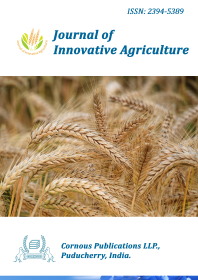
Journal of Innovative Agriculture
Peer Reviewed Open Access Journal
ISSN: 2394-5389 NAAS Rate: 4.05
Submit Manuscript
Peer Reviewed Open Access Journal
ISSN: 2394-5389 NAAS Rate: 4.05
Submit ManuscriptThere is a need to ascertain the competitiveness of tea production in order to determine the level of its productivity. However, there is a dearth of information on the competitiveness of tea production. Therefore, this study investigated the competitiveness of tea production and the challenges in tea value chain on Mambilla plateau in Taraba State. Simple random sampling technique was used to select 136 respondents from 3 communities on the plateau. Structured questionnaire was used to elicit information from the respondents and the data retrieved from the information collected were analysed using descriptive statistics as well as Policy Analysis Matrix (PAM). The result of the analysis showed that 63.24% of the respondents were 40 years and below while 75.74% of the respondents had primary school education and above. The Private Profitability (PP) of tea production was positive and the Private Cost Ratio (PCR) was less than 1 showing that tea production in the study area was competitive. Lack of finance and fertilizer/pesticides, lack of market demand, lack of access to market and lack of modern equipment were identified as the problems affecting tea value chain in the study area. The study hereby recommended that government needs to assist the farmers financially in order to expand their farms.
Competitiveness, tea, production, challenges, value chain
Aroyeun, S.O., T.R. Shittu, and A.T. Yahaya, F.A. Sowunmi, L.A. Odumbaku, F.A. Okelana and M.O.Akoroda. 2013. Green Tea Processing in Nigeria and its Economic Implications. Global Advanced Research Journal of Management and Business Studies, 2(1) :050-055.
Hainsworth, E. 1981. Tea productionon the Plateau, Gongola State of Nigeria. A report on the project by the consultants for the Nigeria Beverages production Company Ltd. Pests and Disease. 120.
Mejabi Dayo. 2012. The Nigerian Cocoa Value Chain: Vertical Coordination for Improved Productivity. Cocoa Round Table Workshop, Akure.
C.R. Obatolu and B.F. Ayoola. 2001. Features of Tea (Camellia sinensis L.) Production in Nigeria. www.o-cha.net. Downloaded on 05/10/2013.
Oluyole, K.A. 2014. Tea Economics in Nigeria, Yesterday, Today and Tomorrow. CRIN at 50. Book in Commemoration of the 50th Anniversary Ceremony of the Cocoa Research Institute of Nigeria. Pp. 219-222.
Oluyole, K.A., Daniel, M.A. and Yahaya, A.T. (2015). Land Use and Its Effects on the Income of Tea Farmers on Mambilla Plateau in Taraba State, Nigeria. Journal of Basic and Applied Research International, 4(4): 144-147.
Oluyole, K. A., O. A.Oni, B.T. Omonona, and K. K. Salman. 2016. Competitiveness and Effects of Policies on Cocoa Production Management Systems in Southern Nigeria. International Journal of Applied Research and Technology, 5(2): 85–93.
Oluyole, K.A., M.A. Daniel and A.T. Yahaya. 2015. Land Use and Its Effects on the Income of Tea Farmers on Mambilla Plateau in Taraba State, Nigeria. Journal of Basic and Applied Research International, 4(3): 122-125.
Oluyole, K.A., Taiwo, O., Shittu, T.R. and Yahaya, A.T. (2016). Economic Analysis of The Input Use Efficiency among Cocoa Farmers in Taraba State, Nigeria. Asian Journal of Agricultural Economics, Extension and Sociology, 8(4):1-7.
Sowunmi, F.A., S.O. Aroyeun, V.O. Okoruwa and M.O. Biobaku. 2009. Tea consumption in Ogun State, Nigeria: Prevalence and Characteristics of Consumers. Current Research Journal of Social Science, (1): 24-30.
Yohanna, M. K. and Chila, N. F. (2014). Influence of Weeds on the Vegetative Performance and Yield of Tea (Camellia sinensis L. Kuntze ) On Plantation Mambilla Plateau in Nigeria. Research Journal of Pharmaceutical, Biological and Chemical Sciences, 5 (2): 1686-1693.
